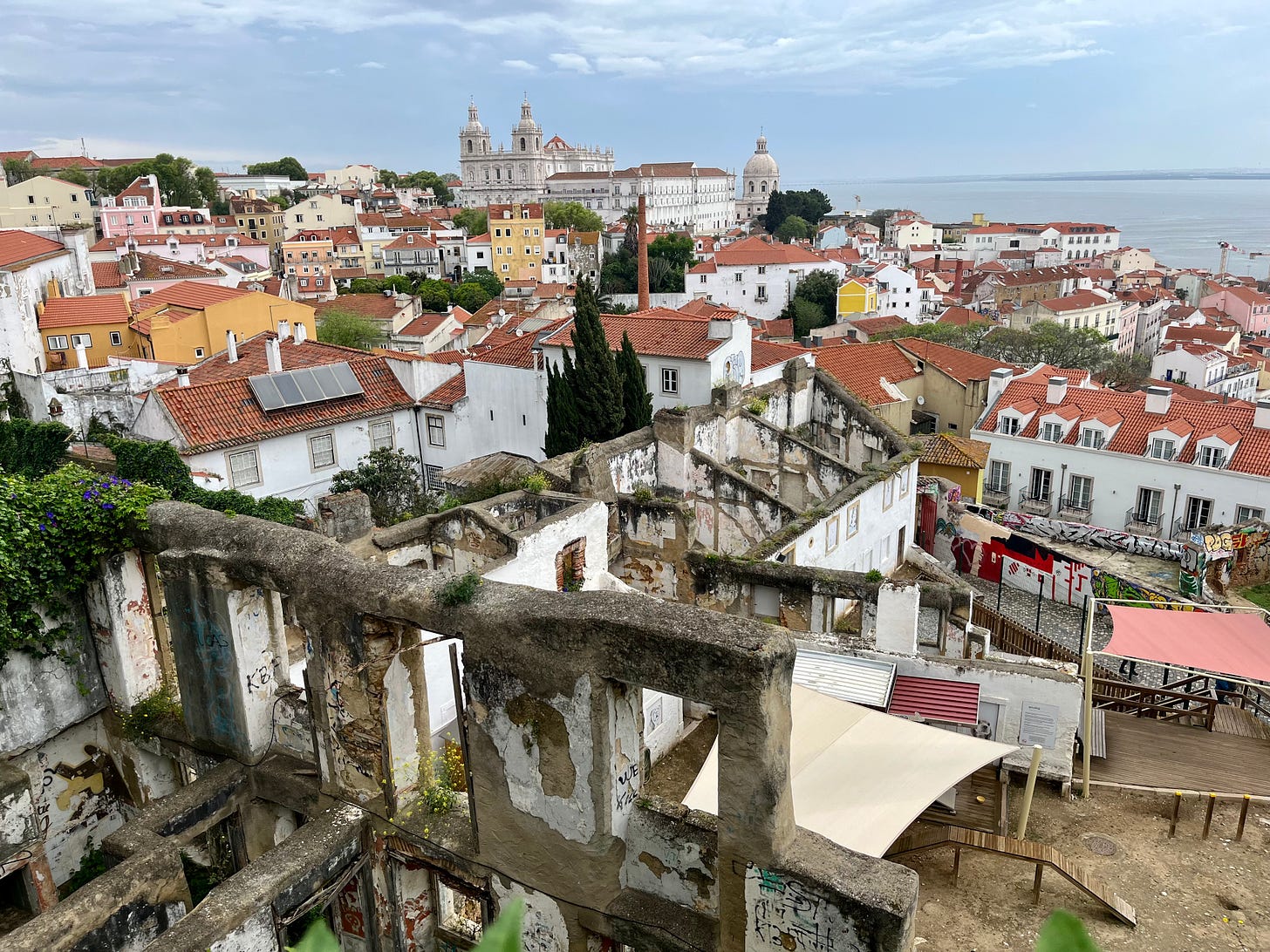Each week, a menu of sorts, around a revolving theme. This week: serving on a murder trial in Baltimore City.
If you haven’t yet, please subscribe to Suppertime! I promise to feed you only once a week, and never after midnight.
Course 1
The Main: Crabs Clawing Out of Hell
It started with a child playing on a neighbor’s stoop in East Baltimore. It ended with a young man dead, a fugitive on the run, an eventual arrest that would bring the killer to trial, a jury full of clowns and conspiracies, and me, head heavy with the weight of handing down a guilty conviction.
This is what it’s like to serve on a murder trial in Baltimore, where one man was judged by twelve after another one was carried by six.
Before we get started, you may want to read my precursor to this story, in which I detail why I love jury duty, and the general selection process for Baltimore City (which is different from Baltimore County).
As I noted in that entry, this was not the first time I was in a jury pool for a murder trial, nor would it be my last. But it would be the only time I was picked as one of the twelve jurors to decide a man’s fate.
I’m going to leave the defendant’s full name out of this story on account of potential “snitches get stitches” and/or personal safety type stuff, but here are some court documents if you want to read more about the case and its unsuccessful appeals. The trial was seven years ago, so I’m relaying this story to the best of my memory. Some minor details may be off, but the general chain of events is accurate.
But let’s go back to the beginning, with a child playing on a stoop.
In Baltimore, row home stoops are treated as public property. Resting places for fentanyl users, piss targets for pet pitbulls, charging stations for a random guy’s burner phone. Quite often, they’re used as playgrounds for kids, since stairs are something to climb, and that’s what kids do. I can attest to this, as my kids will jump on every front step on every block on the walk to school if given the chance.
One day in the fall of 2017, some kids were jumping from stoop to stoop on a street in the Greenmount neighborhood of Baltimore, exactly one block from Greenmount Cemetery, the final resting place of John Wilkes Booth. They were probably being loud, probably being kids.
They were neighbors to a woman named SH– next door neighbors, in fact. Their doors were three feet apart. But on this day, SH wasn’t having it. There had been drama brewing for weeks between her and the kids’ mother. She came out and told them to stop, they didn’t. She told them again, louder this time. And the kids told their mom.
Their mom came out to confront SH, and a loud argument on the sidewalk ensued. Things began to escalate before some family members jumped in to break it up. It could have ended there. It should have ended there. But it didn’t, of course.
Shortly after, the mother/aunt of the kids went with some family members to pick up her older son from work, who was just getting off the day shift at Burger King. He was a 21-year-old, that age between almost a teen and barely a man, working a legitimate job.
SH was also a mother, with a few kids of her own who were, by all accounts, well behaved and good students. She herself was a nurse working at a local hospital, a steady job with a good income. But she was also dating a man named CW. And the thing with CW is that he maybe wasn’t the best boyfriend. For starters, he was someone with a relatively strong rap sheet, who– in his two decades as an adult– had been charged with assault with intent to murder, armed carjacking, armed robbery, felony possession of a handgun, aggravated assault, theft, and a slew of other crimes.
While the neighbors of SH were away picking up their family member at Burger King, she was calling CW, telling him to come back to the house from wherever he was at the time. Which he did, quickly.
Soon after he arrived, the neighbors did as well. The mother, the cousins, the brother with the smell of fryer grease on his clothes after a full eight hours in the trenches of the Whopper wars. As they were approaching their own front door and the stoops on which some children played on just a few hours earlier, SH came rushing out of her own.
There was no initial volley of words this time– a fist-flying melee was immediate. The two women were going at it full force, fighting on the sidewalk, screaming at each other, pulling hair and scraping skin. As the families tried to break it up, CW stepped out of his girlfriend’s house, slipped into the mix, and produced a gun. A Glock 9mm, to be exact. All of it happened fast, and it’s hard for anyone to know the exact order of events, but everyone there saw CW point the gun at someone in the fight.
As he pulled the trigger, that person ducked, and as the round exited the chamber, the person standing in its path was Demetrius, the son and brother and nephew who had nothing to do with any of this, who just a few minutes earlier was joking with coworkers at Burger King. It was the same place, that “after graduating high school, he began working, which gave him the independence he liked,” according to his obituary. “He worked diligently at his job, which gave his work family a newfound appreciation and love for him.”
In a thousand feet per second, his coworkers’ love would turn to loss as the round from a handgun entered the softest part of his throat before a sound could even come out, the same throat that said goodbye– just that morning– to the kids playing on the stoop.
One of those kids was Jordan, who gave him the “opportunity to be the big brother he always wanted to be when [she] came along. He babysat, changed Pampers and fed her. She was up under him every chance she got because that was her Metrius.” Later, he became an uncle, a “role he took very seriously … because now he had a mini him watching and mimicking everything he was doing. He was the best uncle and role model any little boy could ask for.”
A split second after the round entered their older brother and uncle’s neck, it exited out his shoulder just a little bit slower and a little bit lower than it came in, since he wasn’t as tall as the man who pulled the trigger. In an instant, his body fell to the ground, right beside that stoop that started it all.
Quickly, his family called 911, and a Baltimore City Police sergeant who happened to be a few blocks away responded within two minutes. It was only a couple years since Freddie Gray died at the hands of Baltimore City Police Department, and body cameras were now a requirement for the entire force. His camera captured everything.
Hopefully you’ve never been a witness to a murder. Hopefully you’ve never had to see the events unfold in evidence presented at a murder trial. But if you have, then you will know it’s pure chaos and pain and grief and frantic lifesaving measures. All of which was shown on the body camera footage. All of which we had to watch.
Until this point, the trial had all been the story I just told you. The defense laid out their version, the prosecution gave theirs. In one version, it was CW, in another version, it was a random person. But until we saw the video, we never knew the victim.
But there he was, propped up on the ground as his uncle tried to put a towel on his throat to stop the bleeding, a futile effort. The “quiet and calm spirit who without a doubt was always there for his family,” was now quiet and calm as his family tried to be there for him. There was the sergeant trying to help, there was the ambulance arriving on the scene. There was the family screaming and the view from inside their house and, soon after, the uncle sitting on the couch in disbelief and everyone trying to figure out what just happened. A short while later, as an officer stood at the front door, his body camera picked up the family in the kitchen at the back of their row home where they stood in a circle holding hands, praying desperately to God to keep their brother/son/nephew alive. As a jury, we watched all of this, a third party to a play in which we knew already knew the ending– that their prayers would not be answered, that he was soon to be in a coma and would die within the week.
Even after he died, we still saw him. In autopsy photos, his Black body now pale, his neck with a hole where there shouldn’t be one. On the photos were rulers and arrows, typically reserved for showing how much kids grow, now measuring the end of his youth, so we the jurors could know the angle of a foreign object entering and exiting his body.
During the trial, witnesses came and went from the stand. Calls to 911 were played to the jury. Police dispatches relayed. The girlfriend and neighbor, SH, who started the whole fight, claimed CW was never there, that they were only dating and she barely knew him, despite the fact that they were engaged. On the stand, she contradicted every statement she gave the police. Swore on her life that the man who pulled the trigger was just a random person. That he didn’t run down the back alley, toss the gun, and had no reason to be hiding from the U.S. Marshals who would eventually track him down in Ohio.
The police brought their evidence, which was poorly documented and assembled, especially for what seemed to be a pretty open and shut case. Their case was saved by their own body cameras.
One of the relatives of Demetrius, the one who ducked when a gun was pointed at his face, told his account of the events. When the defense asked what kind of weapon he saw, he told them it was a revolver. Surprised, the state’s attorney asked again: “You’re one-hundred percent positive it was a revolver?”
“Yep, it was a revolver, the kind with six bullets that you spin.”
He was wrong, of course. In the heat of the moment, he saw a gun that wasn’t the murder weapon (a Glock with a 15-round magazine, with casings found at the scene) and almost lost the jury because of it.
All the while, the jury had thoughts. So many thoughts and fantasies and delusions. Which was all they had, because aside from me and one other woman, nobody took notes for the duration of the trial. At least one juror fell asleep in the juror’s box on a regular basis. In the deliberation room, all manner of conspiracies were considered, the result of a severe distrust in police (justified) and decades of brain rot from the CSI effect of television dramas. There was no Occam’s Razor here; take the most wild and far-fetched scenario– a hitman waiting in the cut, a fabricated 911 call with a voice that “didn’t sound real,” the pure disbelief that a guy who owned an illegal gun and lived next door could commit a murder– all of it was on the table and considered.
The trial lasted for five days. As with any murder trial, we weren’t allowed to talk about it outside of the courtroom or look up anything related to the case, both of which I adhered to. During that time, the jury seemed to disintegrate. People cared less with every passing day. The theories grew as the trial progressed, like weeds strangling out any sense of sanity. Closing arguments couldn’t come soon enough.
At the end of the fourth day, the closing arguments were heard and it was time for deliberation, which went on for a couple hours before it was time to go home for the evening. At the time, the juror tally sat around half guilty, a quarter not guilty, and a quarter undecided. We’d have to come back in the morning.
I went home that night and called a lawyer friend of mine in Pennsylvania and asked him to further explain the concept of “beyond a reasonable doubt.” It seems like an easy concept at first glance, but it’s really tough to grasp in reality. After all, the line that divides the side of reasonable doubt and the one step beyond it can be the matter of life and death, a decision that separates one’s freedom from a century of incarceration. I didn’t take it lightly, because if I’m ever on the other side of a jury box, I would hope they wouldn’t as well.
The charges in front of us were second degree murder, use of a handgun in a felony or crime of violence, unlawful possession of a firearm following a felony conviction, and carrying a handgun on his person. If CW was found guilty, he would almost certainly face life in prison. To send any human to that fate feels heavy, whether it’s justified or not. I felt that weight as the trial carried into the final day of jury service.
When we arrived in the courtroom that final morning, a few people had come over to the guilty side, but a few held out on not guilty verdicts, at least one of whom was not budging. To be honest, I felt the case wasn’t perfect, especially on account of the mediocre detective work and the half-assed witness testimony presented by the state’s attorney. But overall, it was a Swiss cheese defense, with plenty of holes for a “not guilty” verdict to fall through. I felt that he was guilty beyond a reasonable doubt.
After an hour or so of going back and forth, another juror (the only other one who took notes during the trial) asked if we could view the body footage again. We rolled it out on the laptop, and all huddled around to watch. In the post-shooting chaos, a police camera picks up a candid conversation between a couple family members, something we hadn’t recalled seeing in the courtroom.
In the video, the uncle is in the living room as another family comes in the door:
“What happened!?!”
“That big guy next door – Shaun – he pulled a gun out and shot him!”
“They were little kids … and he wants to impress his girlfriend by pulling out a gun?”
And that was that. As soon as we saw that on video, a witness in the heat of the moment relaying exactly who the killer was, then it was over. Everyone came over to the guilty side, and the lead juror wrote it all down for the judge, put the verdict in an envelope, and knocked on the door to let us out.
CW was found guilty on all counts. Soon after, he would be sentenced to prison for 75 years, effectively a life sentence. He would indeed marry SH, the neighbor who started it all, who called him to the house, who lied for him on the stand. She would file for divorce in 2023.
In the end, I’m glad that justice was served and that I was able to hand down some sort of closure and sense of justice to the family of Demetrius. But none of it was hopeful or good.
It made me think about the 300-plus murders in Baltimore each year, and how each one is a stone throwing ripples out that go out so far beyond the breaking news headline. Waves running into each other, crashing across communities, bouncing like atoms full of negative charges, clawing like crabs to get out of hell.
I think about how even if you navigate all of that, how even if you’re a “quiet, calm spirit who without a doubt was always there for his family, who would do anything for them, who was loved by many and respected by all, whose smile could light up a room and his laugh was contagious” you can still get off work and get gunned down for no other reason than you were just … there.
All because an adult started a bullshit fight over a couple of kids playing on a stoop.
So that’s what it’s like to serve on a murder trial in Baltimore city, and what it’s like to send a man to prison for life for taking that of another.
Rest in peace, Demetrius. I’m so sorry I had to be a part of your story.
Course 2
A Word of Gratitude: Seafood Paella
This past week, my family traveled to Spain for my brother’s wedding. If I’m honest, I was a little annoyed at his decision to have a destination wedding, for all the reason that destination weddings suck: cost, logistics, schedule, etc. But I’m glad it happened.
My whole family got to experience one of the most beautiful places any of us have ever been, the south of Spain in a small village called Mijas Pueblo, on the mountainside overlooking the Mediterranean where you could see Morocco on a clear day. The weather was perfect, the air was fragrant with all types of blooming flowers, the white walls of the Spanish pueblo architecture shone bright in the midday sun.
One of my best friends was also there with his family, so we got to spend a lot of time together. My kids were fantastic travelers and really rolled with all the punches of travel. I ran a little bit, but not much. We hiked to the top of a mountain at sunrise, 2400 feet of elevation gain in two miles. We swam in a creek with a 20-foot waterfall and a natural water slide. I got to drive a stick shift again for the first time in a decade. It was super busy but so much fun.
And then there was the wedding, where my brother– who I was 99% sure would die of a fentanyl overdose just five years ago– was standing in front of his closest family and friends, marrying the best woman that he could ever imagine.
It was a beautiful wedding with some of the best food I ever had, including an enormous platter of seafood paella. We danced into the night and at one point all the groomsmen starting jumping into the pool by the dance floor, then all the kids, including my own. We were soaked in all our dress clothes and happy and loving life beneath the starry skies in Spain.
It may been the best wedding I’ve ever been to, if only for the fact that my brother was alive and happy and starting a grand life journey that at one point I never dreamt would be possible.
And for that, I am grateful.
Course 3
Dessert: A Repast of the Past Week
I pretty much recapped the last week, but I didn’t mention that we had a ten-hour layover in Lisbon, Portugal, which proved to be one of the best days of the trip. We had to get up at 4 a.m. for our initial flight out of Spain, and after we arrived in Lisbon at 8 a.m., we decided to explore the city. After doing a little bit of research beforehand, we stored our carry on luggage in a locker and caught the subway for a 45-minute ride into downtown. We had breakfast, lingered in a cafe near an old castle, caught some amazing sights from the top of the hill, meandered through the Alfama neighborhood checking out shops and back alleys and marveling at the beauty of the city. And then we came home.
Then I headed up to Pennsylvania for a 40th birthday for my best friend Brian, whose wife threw him an “I Think You Should Leave”-themed party, complete with Bart Harley Jarvis’ aggressive underbite, hot dog costumes, a pig with a Nixon mask, nude eggs, driving crooners, and some very complicated shirts.
I am very tired but very happy.
I also contribute to The Drop, a weekly email from Believe in the Run, where I round up running news and stories in a generally sarcastic (and sometimes heartfelt) manner. You can subscribe here.
I’m also the co-host of The Drop running podcast, one of the top running podcasts in the country, where we mostly talk about things other than running that thousands of people seem to find entertaining.
Ingredients List
📖 : I mentioned last month that I was reading “North Woods” by Daniel Mason, which I did finish a couple weeks ago. Overall I really enjoyed it though I felt it started to drag a bit in the second half. I’m still not totally sold on the ending, sometimes I feel like more editors could push back on the author’s insistence to tie up all the loose ribbons on a story. I think a little bit of mystery could go a long way in books like these. Overall, I did really enjoy the book.
🎵 : “Our Kids Are the Least Flourishing Generation We Know Of,” The Ezra Klein Show // If you’ve read any of my stuff over the last year, you’ve probably picked up on the fact that I’m a big proponent of Jonathan Haidt, childhood independence, no screens for kids, free range parenting, and so on. If you’ve already read “The Anxious Generation,” then this conversation isn’t super eye-opening, but they do cover some other interesting ideas related to childhood, the rise of depression and anxiety in teens, phone addiction, and more.
📺 : “Gold and Greed: The Hunt for Fenn’s Treasure” // This Netflix documentary hits every feel inside of me, from treasure hunting to adventure. My friend David and I had followed this treasure hunt since Fenn first published his poem back in 2010, with our own dreams of searching for the treasure, but alas, adulthood derailed our grand plans. It was cool to see the stories of the treasure hunters who risked their lives and fortunes for this treasure hidden somewhere in the Rockies.
END OF MENU
Thank you for dining with me this evening, I hope the service was acceptable. Tips (whether monetary or recommendations to others) are appreciated, but not expected.









This essay sits with me like few others have. The weight of your role in that Baltimore courtroom, the moral gravity you convey without flinching from complexity—it's a masterclass in sitting with uncomfortable truths. The way you honor both the process and the human lives entangled in it reveals why justice can never be as simple as headlines suggest. Thank you for writing with such unflinching integrity.
Thinking of Demetrius and his family - your words honor him in a small, but powerful way as we learn his name through your story. Thank you. Also, a big mazal tov to your brother and his new wife!